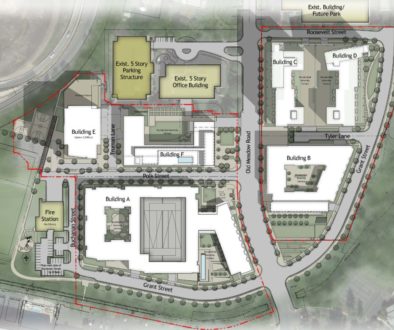Ranking University Urban Planning Programs
This blog is for the soon to be high school graduates, community college students gearing up to transfer, those who are looking for a career change, parents trying to gather information on schools for their children, or for those of you who just like reading about different universities this blog series is for you. I will be gathering pertinent information about several different colleges that offer urban planning or environmental planning as an undergraduate program. I will focus on the following seven items.
- History of the university and when they began to offer the program.
- University location
- Admission requirements and statistics.
- Cost of attendance.
- Urban Planning Program
- Specializations
- Programs rank according to Planetizen.
History
The history section will give an account of not only the university but a little history of the city the university is located in. I find this to be very important when you are searching for colleges. You may ask why, but think about it, if the city the university and planning program is in does not exhibit growth or great planning practices then what can you expect from the university and its program? Many great programs are located in great cities and in turn create great planners who not only go out into the world to do great things in the planning field, but many of these people contributed to the city the university is located in by way of keystone projects and internships. Lastly, I will provide a brief history of the program and how and when it came to be. My favorite saying is if you don’t know where you been they how can you know where you are going. The history of a university and its programs are very important.
Geographic Location
This section will be short and sweet and will provide you with information about the schools geographical location and what you can expect weather wise. Look what we all consider to be great weather is subjective; and we all have different feelings about what type of weather we like. So, if you like hot weather, maybe you should think twice about going to school upstate New York, just saying.
Admissions Requirements and Statistics
Now we are getting to the good stuff or what I like to call the meat and potatoes. This is what we all are waiting for and that is how difficult is it to get into the school program and what are the statistics of graduates from the program. No one, and I mean no one wants to go to school that doesn’t have a well thought out process of admissions and at the same time no one wants to attend a school where just anyone can attend because it can come across as desperation and would make me think twice about if the educational program is adequate. Statistics is important but it isn’t key I for one didn’t attend a top rated school. The program was very small, but the statistic of those finding jobs after graduation was high and that was huge for me as I graduated during the economic downturn also known as the “Great Recession. I found employment soon after graduating and have never been without a job since my college days. I attribute some of this to my college education and my Alma Mater as they did set me up for success.
Cost of Attendance
This is quite obvious, but I will provide you with a snapshot of how much debt you can expect to incur by attending said college. I for one, factored this into my school choice and even transferred from my first university choice to another school due to the cost and me taking a step back and looking into my financial future objectively. I did not want to be in debt my entire life just to say I went to a particular school. I am ten years into my career and have been debt free for years. This revelation on wanting to be debt free early on has allowed me to make decisions about my career without desperation and has permitted me to move around based upon what I believe would allow me to become a more well rounded planner as opposed to choosing jobs solely based upon monetary gain. Therefore, do not just pick a school based upon its popularity you can be setting yourself up for financial woes well into the future.
Urban / Environmental Planning Program
We will get into the program and what sort of courses you will need to take in order to graduate. I will discuss the amount and type of prerequisites and electives the program requires. Now, most people despise electives and prerequisites, but honestly in the field of planning you will have to reprogram your mind to not look at these as a waste of time. I know you are eager to get to the core courses, which makes since in other fields, but Planners need to be well rounded and multifaceted as you will be faced and responsible for many different things. For instance, it is important to have not only a good understanding of planning practices, but of architecture, social issues, environmental issues, history, politics, government, but you need to have a great grasp of statics, word, PowerPoint, public speaking, customer service, reading comprehension, writing skills, and project management skills just to name a few.
So you see planners have to be jacks of all trades you do yourself a disservice if you only concentrate on your core planning courses. I took all sorts of courses from urban design, to CEQA basics, to GIS (geographic information systems/science), to jazz, to cultural anthropology to sociology in the black community. All of these electives and prerequisites have set me up for success and to be a well rounded planner. I am what is considered to be a generalist as I don’t truly have a specialty in my opinion, but now that I am in a new state I do which is CEQA/NEPA/Environmental Planning. But, in a future blog we will get into how in different states what was not considered a specialty can become one in a different geographical location.
Specializations
The last paragraph was a great transition into this topic which is planning specializations. Planning specializations are great but not necessary and there is no problem with being a generalist. It is my belief that having a specializing will not make you more qualified or sought after as a generalist. It all depends on what a company’s agenda is at the time and what they need. Like I said me, a generalist has never been without a job and I always have been paid very well. But, if you want to set have a specialization go for it as I don’t discourage it. I myself moving from California a state that is very aware and sensitive to environmental concerns to my current state of residence, now wear the badge of specialization where in California all Planners are well versed in environmental planning. It allows me to negotiate more pay and helps me to stand out, but I still consider myself as a generalist.
Nonetheless, the section will focus on one specialization you can add to your planning education. I will try to look at unique ones as well as the standard ones and give you my thoughts on the courses and how it may or may not benefit you as you step into the real world.
Program Rank
I will be using Planetizen to rank each education program. Planetizen is an independent platform that creates and curates stories to bring awareness to the planning field. Well, each year Planetizen publishes a rank of planning programs. Because they are well known and trusted we will be utilizing their ranking for those who care about stuff like that.
Conclusion
Please understand that these are my thoughts and opinions which are subjective, none of them are absolute and I encourage all of you to come to your own conclusion on important life decisions and I also challenge you all to challenge me as this helps us both grow and that is what life is all about. If you have a school that you are interested in that I haven’t written about please do not hesitate to contact Urban Planning Life, LLC or the Friendly Neighborhood Planner by visiting our Contact Us page. Cheers to the Urban Planning Life because for a select few of us Planning is Life!



